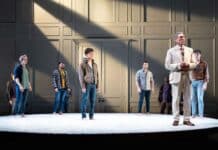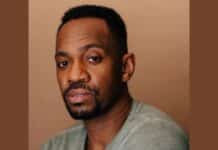Who knew that an ancient epic poem — the oldest surviving work of English literature — could come off as hyper-relevant to the epically treacherous moment we’re in? With the world premiere of Beowulf, A Retelling — mounted in a cozy black box outfitted with tiny tables and a cash bar — Taffety Punk Theatre Company has delivered a performance experience of uncanny pertinence. Marcus Kyd, artistic director and co-founder of the company, freely adapted the text, and for about an hour and a half on stage solo, he transfixes us as Storyteller and a singer-musician. As soon as the show I saw was over, I knew I wanted to talk with him about what he had achieved, and he graciously made time for a conversation on Zoom, edited here for length and clarity.
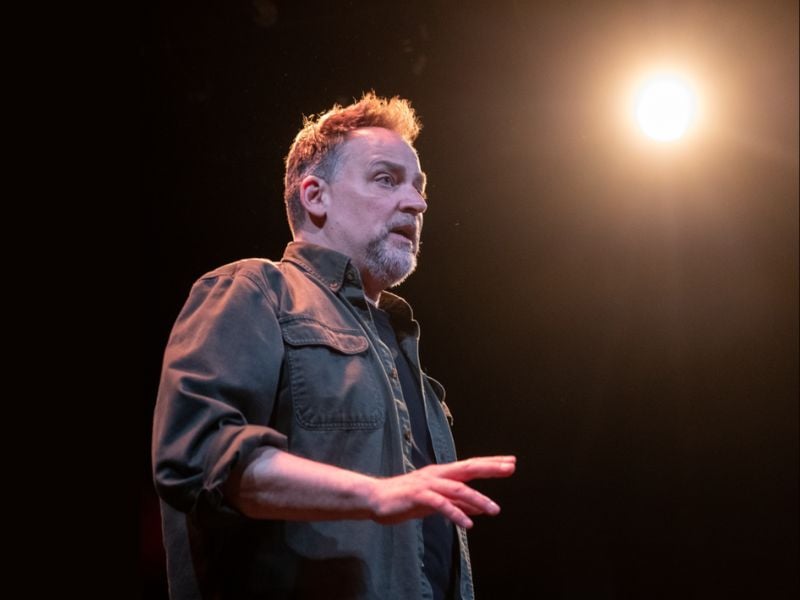
John: I remember when you told me you were working on a one-man Beowulf, and I thought that sounded very intriguing, but also: Beowulf!? That Old English slog I read in freshman English!? Well, when I saw the show on its feet, I was knocked out. Here is an epic saga from 10 to 15 centuries ago, and you have retold it in a completely engrossing and approachable way, such that it plays like a parable for our times about political courage.
Marcus: Thank you. Really appreciate that. That was all the goal.
I’d like to begin by exploring that breathtaking moment in your storytelling when Beowulf, having heard of the carnage wrought by a monster named Grendel, steps up to resist and fight back. Without hesitation, without agonizing over it, he says simply, “I’ll go.” Would you talk about that moment?
This is when we learn about the core of Beowulf’s character. He is driven to help others. So in the show, the first time Beowulf says “I’ll go” is after he hears about the Grendel attack. Beowulf is always the person who says, “ I want to help.” He’s a really selfless character.
He says, Let’s go. Let’s do this. It’s the right thing.
I am personally moved by Beowulf’s story, and it’s these moments where, in rehearsal, occasionally I get choked up because of the weight of what’s happening.
I want to talk about Grendel, this monster who had this absolutely insatiable and inhumane appetite. You and the director, Chris Curtis, have emphasized, in his words, that “monsters are real. And they hurt and kill people for real.” Would you talk about how you depict the monster in the show and how you envision it in an era when CGI monster figures are commonplace?
In my mind, Grendel is an ogre, or like the cave troll in the Lord of the Rings movie when they’re stuck in Moria. In the original poem, the characters keep saying they don’t know what Grendel is and they don’t know where he’s from, but when they speak of him and his mother and their ilk, the characters also speak of ogres and trolls. We are told it takes four people to carry Grendel’s head when it’s finally cut off. And he eats people.
Shamelessly.
Right, so what we decided to focus on was his size and his appetite.
Not only are our imaginations familiar with fictional monsters in modern media, but there’s a whole host of superheroes, each with some sort of superpower. But Beowulf seems dramatically different from your typical Marvel Comic action figure. He’s very strong, and he goes it alone. He confronts the monster wearing no armor because he wants a fair fight. But his real superpower seems to be simply his readiness to prevent others from being harmed. And that, in my mind, counts as a superpower in this story.
Absolutely. The mythic quality of his strength is there. I don’t think he’s Superman-strong or Jessica Jones–strong, but he’s renowned to be stronger than most. But yes, I do think his superpower is his willingness to go and make the hard choices to help people, keep people from harm. He’s just thinking about other people all the time. Selflessness, maybe — I think that’s his superpower.
Love that idea. Selflessness is a superpower.
I’ve been reading comic books for a long time, so I’m really excited that you say that. It’s one of the things I think we love about Wonder Woman, and something the first movie captured so well is that in addition to her superpowers, compassion is one of her greatest strengths.
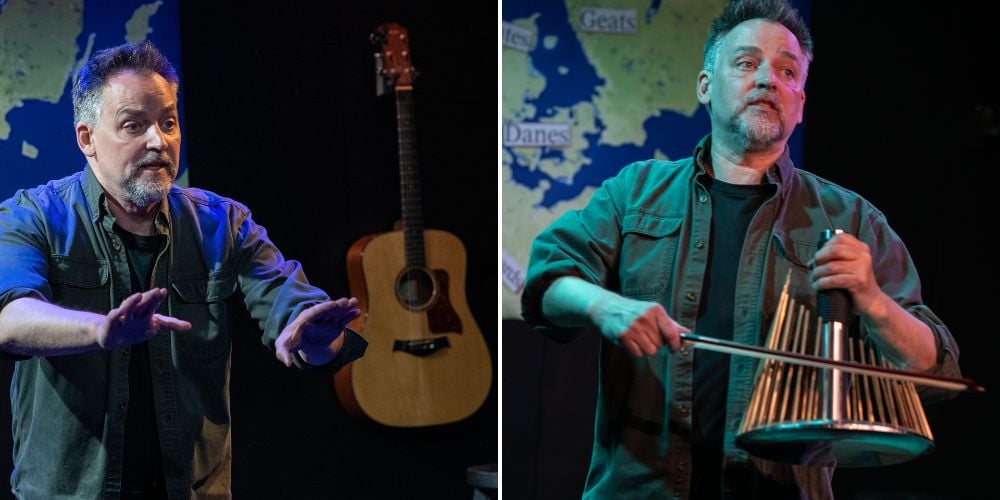
Your script is amazing. It sounds throughout like you are telling us, personally and in person, a totally absorbing story, in the moment, in your own words. There’s no off-stage authorial voice. Would you talk about the process of creating that immediacy?
Thank you. It was a challenge because the original poem steers off into a lot of side quests very quickly, and there are a lot of archaic tribes and countries that nobody’s ever heard of anymore. So the first thing we did was ask ourselves, Okay, what is happening? We got a bunch of actors in the room, our dramaturg Tiffany [A. Bryant] was there, we had three translations out on the table, and we took turns reading from each. We’d take a passage, and we’d hear Tolkien’s translation, and then we’d hear [Maria Dahvana] Headley’s translation, then we’d hear [Seamus] Heaney’s translation. And we would go back to one of the transcriptions of the original and be like, Okay, so what is actually happening?
There are very difficult things in the poem to translate, and it sometimes goes off in weird directions. So that was step one: What is happening? Who to? Who were these people? During that first week, we made a list of things that actually scare us versus monsters that we might be fascinated with. We did that side by side because we were asking questions about what is a monster and is a monster worse than something that you fear — trying to get at Beowulf’s heroism, which is unfortunately rare. After that, it came down to me and Chris and Tiffany being in the room together and deciding what’s the best way to go through this. There are three big fights we had to set up. We had to show how bad the circumstances are and introduce our hero. Figuring out how to craft the script was a big challenge for me. Luckily, we had some time here at the Capitol Hill Arts Workshop, where I literally locked myself in this room and started recording myself telling the story to no one in my own words.
That so comes through, and it’s to us — a completely in-the-moment oral quality that’s just riveting.
Thank you.
And I love the concept of a mini mead hall. It’s like a dive bar or a comedy club where you might be sitting stageside at a little table next to someone you haven’t met yet. DC Theater Arts’ reviewer called it “a really fun night out,” and it really is. Would you talk about how the play’s theme relates to such a social space?
There were a few reasons we chose to do it this way. One was Maria Headley’s translation. In her introduction, she suggests the poem sounds like somebody at a bar telling a story very loudly. So we really ran with that thought. Also, Seamus Heaney said the more he got to learn Old English while he was translating, the more it sounded to him like the “big voiced Scullions” of his Irish family.
We don’t want to interact with people like in an immersive play, but we do want to connect with them closely, hear their reactions. And I can then react to that stuff live, which is great. So putting the tables in, making sure that people could get drinks, made it feel a bit more like where we’re all from. A lot of the [Taffety Punk] company members grew up in the punk rock scene, where sometimes you’d go to a show and it wasn’t just bands; there would be somebody doing spoken word.
Beowulf, A Retelling had that spoken word quality.
And that’s what we wanted to go for; we wanted it to feel intimate.
Your singing and guitar playing and Elijah Thomas’ lighting design in that intimate black box have an outsize impact — there are some truly melodious troubador interludes and some genuinely jump-out-of-your seat lighting effects. There are also several vivid digressions, interpolations of contemporary heroism, which were fascinating in their own right but which also could be read as placeholders where any number of portraits in courage could be filled in.
We started to ask, who are the heroes we know? And to not just say Aquaman, but to say, actually, there are real people fighting for good in our world, for a long time, and they don’t always win.
I don’t think this is a spoiler — the epic poem has been out there for quite some time — but in the end, Beowulf gives his life for the humanitarian cause he has embraced. In the course of the story, he bravely and singlehandedly vanquishes two monsters — Grendel and Grendel’s vengeance-seeking mother, who’s also a piece of work — but when Beowulf goes up against a third malicious monster, he is killed. If one is tracking the show as a parable about the importance of political courage, that’s a grim and sobering ending. What do you make of it? Should Beowulf have stayed home and not got involved?
Well, first of all, he couldn’t. That wouldn’t have been his nature.
Beowulf strikes me as the kind of person who, even if his legs were cut off, would be crawling toward the fight on his hands. But what was important about that lesson for us was also — we say it in the show — there are going to be scars. If the fight is important, you’re not getting out of this without getting hurt.
I worry that we live in a time where there’s a lot of idealism — which I love; I’m an idealist myself. But if that idealism doesn’t include the reality that fights are hard and that you might get hurt fighting for what is right, be it trauma later or physical scars or just loss of any kind, then that idealism is foolish.
This brings me to my last question, and it partly pivots on what I love about theater, which is that it can portray character vividly and deeply, the ethical core of a person. You said Beowulf wouldn’t dodge this fight. It’s not who he is. And your theater piece lifts that character — not just idiosyncratically but morally — up to our eyes to see and understand and relate to. With that in mind, how do you see the role, responsibility, and opportunity for theater in these dark times?
I think our role doesn’t change. Our role has always been to ask the questions that exist between religion and psychology. There’s a void, I think, between religion and psychology where theater lives, and by presenting fictions, we get to engage with truths.
And that’s the work. That’s our job. That’s what we do. I don’t believe that you have to worry about whether or not it’s ever the right time to tell a story. I think the story of Beowulf is always relevant. I think you could stage Richard II on any night in the last 400 years and forever into the future, and it would be relevant to what’s happening in the world. So I never worry about that. There’s going to be something in the story that’s relevant. If it’s a good story. Occasionally, a story suddenly becomes hyper-relevant, and that’s great. That’s a good moment to drive the art through. But what we do is put questions before the audiences and show potential answers, and most importantly, feel something about the result of those answers together. That’s the magic; that’s the power of theater. I could read an internet article about this big question, but experiencing it with 40 other people means we’ve just shared something. And what I want people to take away is that we had this event together, and we’re all leaving the room now maybe with more questions, maybe another answer, maybe a question about who we are.
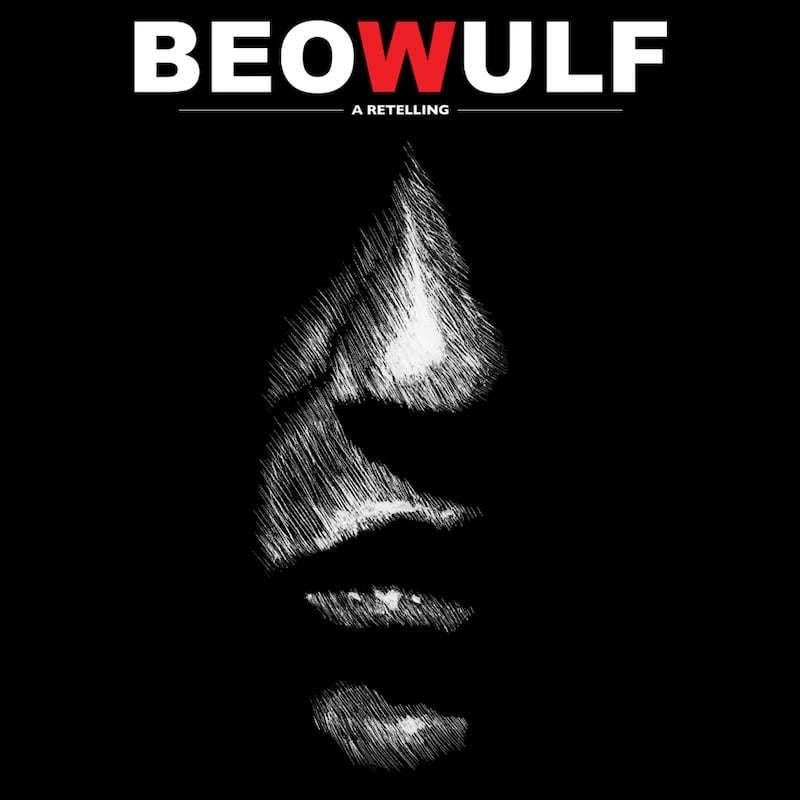
Beowulf, A Retelling plays through April 19, 2025, presented by Taffety Punk Theatre Company, performing at the Capitol Hill Arts Workshop, 545 7th Street SE, Washington, DC. Performances are Wednesdays through Saturdays at 8:00 pm. Purchase tickets ($20 reserved seats at tables, $14 reserved riser seats) online.
Running Time: Approximately 90 minutes
Beowulf, A Retelling
Freely adapted from the original poem by Marcus Kyd
Directed by Chris Curtis
SEE ALSO:
Taffety Punk’s ‘Beowulf’ reclaims the heroism we need to slay today’s dragons (review by Deryl Davis, April 7, 2025)
Taffety Punk revamps ‘Beowulf’ as a barroom tale (news story, March 20, 2025)

